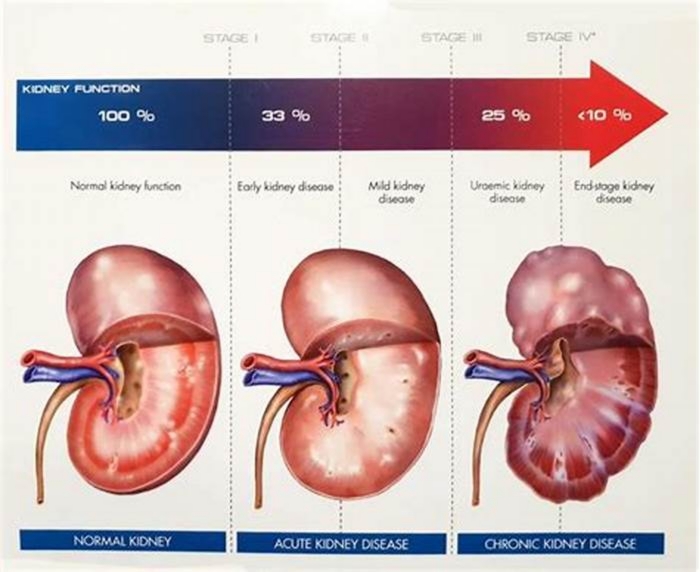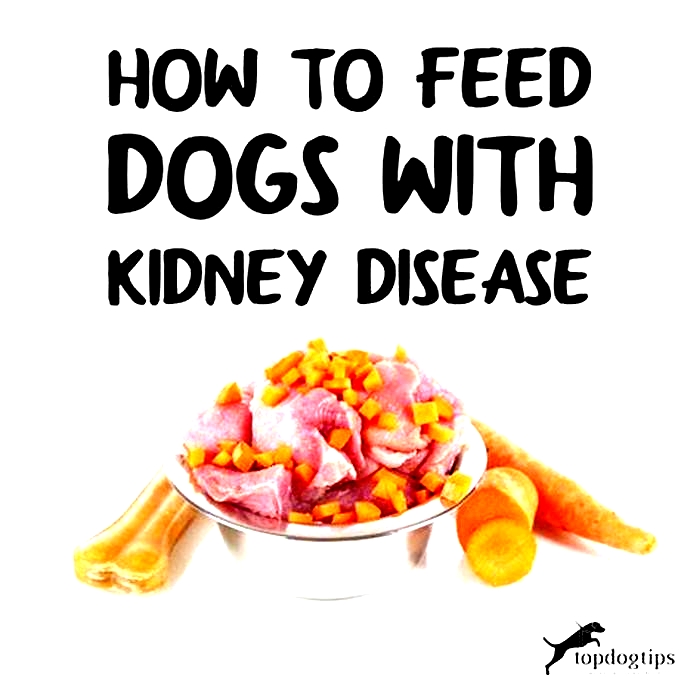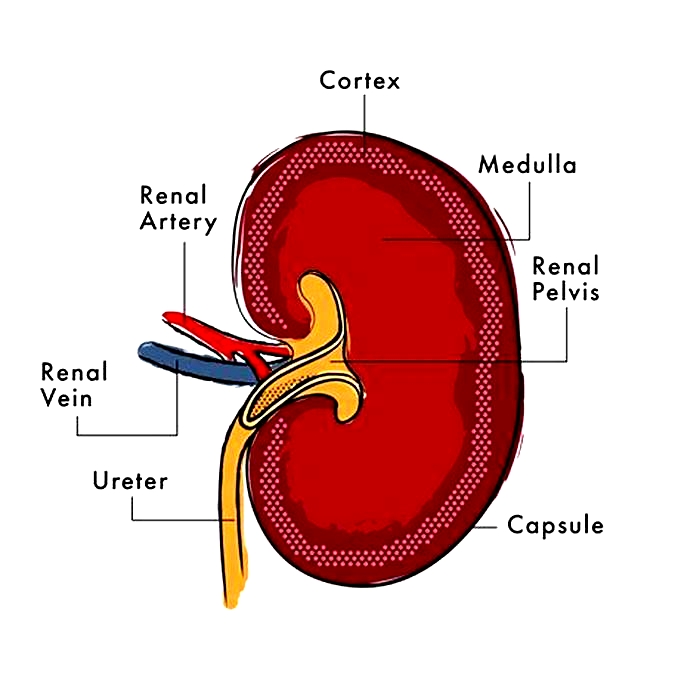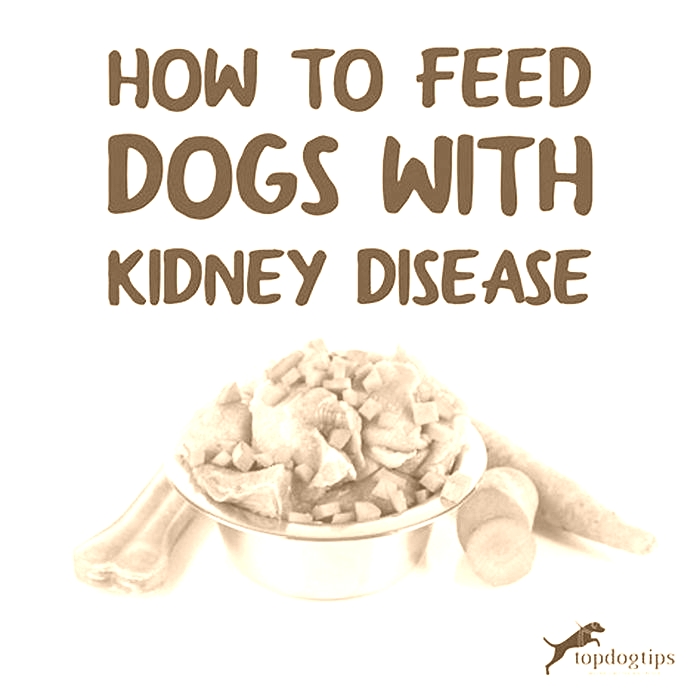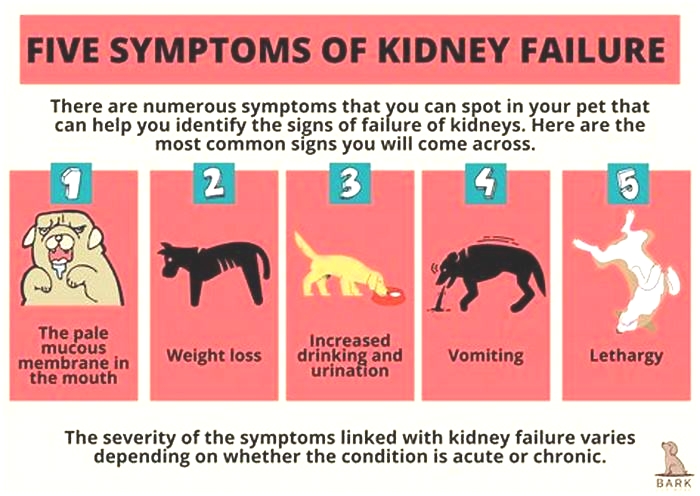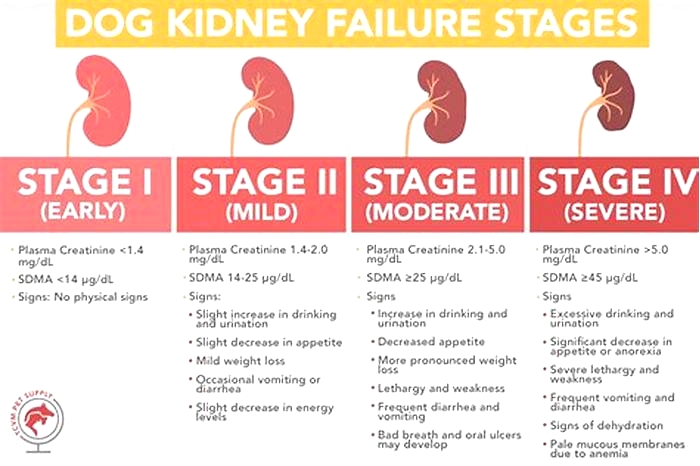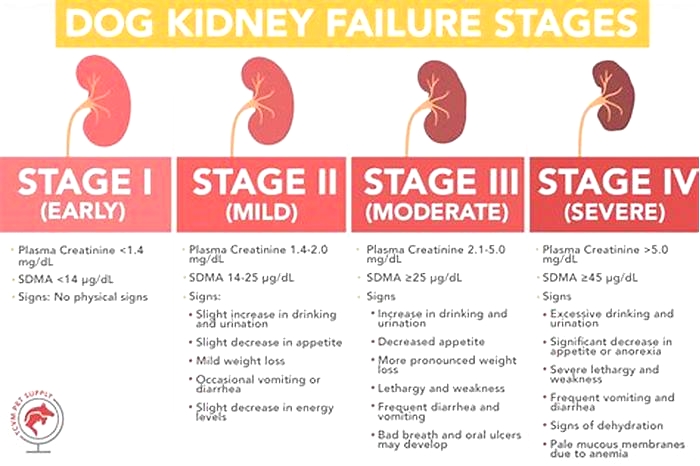kidney disease in dogs
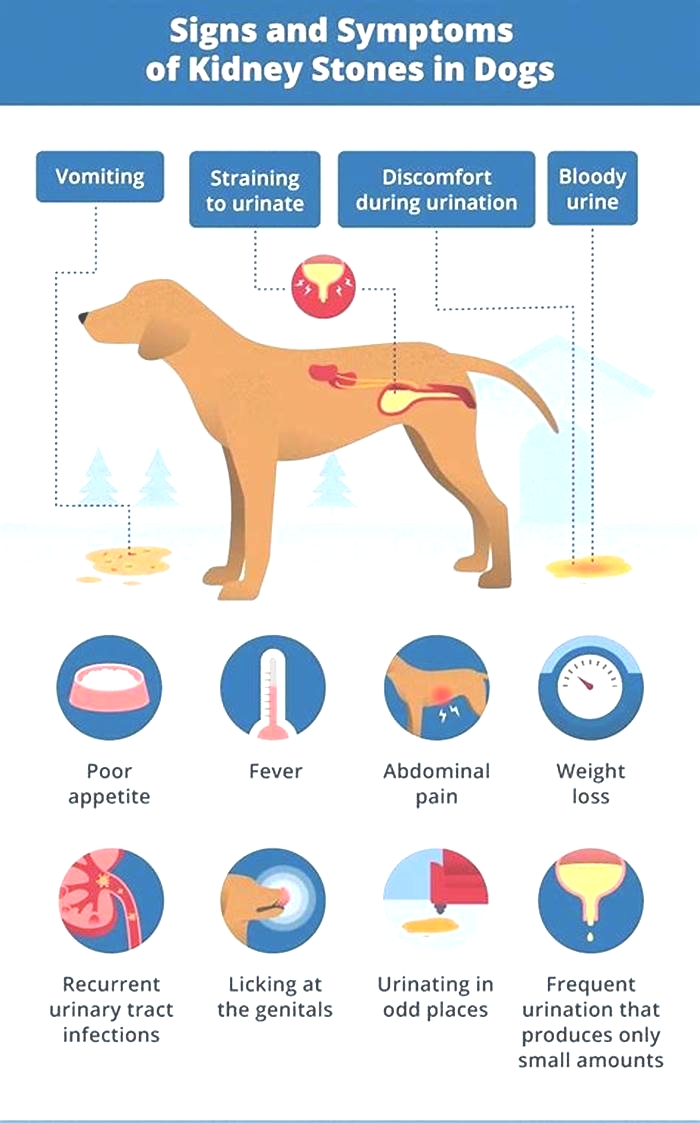
Kidney Failure in Dogs
What Is Kidney Failure in Dogs?
The primary job of the kidneys is to filter the blood by removing waste products and controlling the amount of fluid and nutrients kept in the body and how much is passed in urine.
With any type of kidney failure, this filtering isnt working well, so waste products are not properly removed from the bloodstream and too much fluid is passed in urine along with proteins and electrolytes. As waste products build up in the blood and tissues, dogs can get ulcerations (tears) in the lining of their digestive tract as well.
Kidney failure may also be referred to by terms listed below. The word renal refers to all things related to kidneys, and is often used interchangeably. Failure, insufficiency, and disease are commonly used to describe similar issues with the kidneys.
Kidney disease is often divided into categories based on how long it has been affecting the dog. Acute renal failure occurs in a very short time frame, and is often caused by eating or drinking a toxin or getting a severe infection that harms the kidneys. Chronic kidney disease refers to a process with a more gradual onset or one that has been happening for a longer period of time.
Changes that can occur with an aging pet are often caused by chronic kidney disease, but if a dogs kidneys were damaged by eating a toxic item several months ago and he now has renal failure because of this, it is also known as chronic kidney disease.
Symptoms of Kidney Failure in Dogs
Drinking more water (polydipsia)
More frequent urination (polyuria)
Urinary accidents in house-trained pets
Lack of energy
Refusing to eat
Vomiting
Drooling
Changes in defecation (either diarrhea or constipation)
Weight loss
Mouth sores
Bad breath
Weakness
Causes of Kidney Failure in Dogs
Kidney failure can occur because of an acute event, such as a toxin ingestion or infection that harms the kidneys; degenerative (worsening) changes over time; or an underlying medical condition that damages renal tissues, which can occur due to genetic predispositions in some dog breeds.
Specific causes include:
Ingested toxins
Metabolic diseases
Kidney infections
Autoimmune disease
Cancers
Breeds that are prone to inherited renal failure include:
How Veterinarians Diagnose Kidney Failure in Dogs
Your veterinarian will want to run several tests, in addition to a physical exam, to diagnose kidney failure, such as:
Complete blood count
Chemistry panel
Urinalysis with culture
Abdominal ultrasound
Treatment of Kidney Failure in Dogs
Treatment of kidney failure is based on the severity of the disease and whether it is acute or chronic.
Acute kidney disease is treated with hospitalization and IV fluid therapy to support the kidneys and help them remove wastes. Depending on the cause of the disease, decontamination medications, toxin-binding medications, antibiotics, or medications to support the gastrointestinal tract may be given. In extreme cases, renal dialysis can help the kidneys. This last procedure is rare, only available at some university or veterinary specialty hospitals.
Chronic kidney disease requires careful management of dogs at home. They need to have access to water at all times and be encouraged to drink water. Many dogs have improvements with a prescription kidney diet. Some dogs need to be on medications to control high blood pressure or to protect their stomach. Pets with chronic kidney disease need to see their veterinarian often so that their renal values can be checked. Some dogs with kidney disease need to receive injectable fluids at home or may even need to be hospitalized at times to help their fluid needs.
Recovery and Management of Kidney Failure in Dogs
With acute kidney failure, prognosis is variable depending upon the cause of the disease, how severe the disease is, how damaged the kidneys are, the speed and aggressiveness of treatment, and the dogs response.
For chronic renal failure, long-term prognosis is not good. Most dogs die or are euthanized within a year because of poor quality of life.
The families of dogs with kidney disease should expect to watch them closely and will need to see their veterinarian often, especially as their pets kidney function gets worse. These dogs will be easily dehydrated, as their kidneys are not able to keep water in their bodies. Any infection, vomiting, diarrhea, or changes in appetite or activity could severely dehydrate the pet and worsen the disease.
Kidney Failure in Dogs FAQs
How does kidney failure differ from kidney disease?
Kidney disease is a broader term that includes any problem with the kidneys. Kidney failure is a specific term that means the kidneys cant keep up with filtering waste products and managing fluid levels.
Is kidney failure fatal in dogs?
Depending on the severity and progression of the disease, kidney failure can be fatal.
WRITTEN BY
Laura Russell, DVM, MBA, DABVPVeterinarian
Dr. Russell is a 2003 graduate of the University of Missouri. She is board certified in Canine and Feline Practice, certified in canine...
Chronic Kidney Disease (CKD) in Dogs
What Is Chronic Kidney Disease (CKD) in Dogs?
Dogs have two kidneys, which are vital for maintaining lifes day-to-day processes. They have a variety of functions, the foremost of which is to filter and excrete toxins and waste from the body. Other tasks of the kidneys include regulating fluid, mineral, and electrolyte balance; conserving water and protein; maintaining blood pressure; and producing red blood cells.
Many causes are associated with progressive loss of kidney function, and unfortunately, once lost the damage is irreversible. As a result, unfiltered waste products and toxins build up in the bloodstream, leading to a generalized state of nausea and malaise. When left untreated or unmanaged, a dogs quality of life suffers. Early diagnosis and intervention are vital to managing the disease and maintaining your dogs comfort and well-being.
CKD is a progressive disease that has often been present for some time before it is diagnosed. It is typically classified into four stages, based on laboratory values and clinical signs:
Stage I: No clinical signs are seen.
Stage II: Some clinical signs are seen.
Stage III: Many clinical signs are seen, and pets often feel sick.
Stage IV: The majority of clinical signs are seen, often as an emergency. The quality of life for the pet is poor.
Is Chronic Renal Failure the Same Thing as Chronic Kidney Disease?
Chronic kidney disease (CKD), renal insufficiency, and chronic renal failure (CRF) are different terms often used interchangeably to describe declining kidney healthwhere over time the kidneys become less efficient in their required tasks and the results are life-threatening.
Symptoms of CKD in Dogs
Dogs typically wont experience any symptoms until the kidneys have lost about 75% of their functioning capacity. The higher the stage (meaning the greater the extent of kidney disease present), the more symptoms are exhibited.
Dogs in any stage can experience the following symptoms:
Anemia (low red blood cell count)
Changes in urine output, usually increased
Decreased appetite
Dehydration
Increased thirst
Muscle wasting
Nausea
Oral ulcerations (sores in the mouth) and bad breath
Pale gums
Poor coat appearance
Sporadic vomiting
Vision loss, often attributed to secondary hypertension (high blood pressure)
Weakness and lethargy
Weight loss
Causes of CKD in Dogs
Chronic renal failure by definition is a disease that occurs over a period of time; it is an ongoing, progressive, and irreversible process where, for some dogs, the cause remains unknown despite extensive testing.
Often CKD develops after a serious kidney injury such as from a severe infection (e.g., leptospirosis, tick-borne disease, or pyelonephritis), heat stroke, envenomation (from a venomous bite or sting), or the ingestion of toxic substances like antifreeze, NSAIDs (ibuprofen), or certain antibiotics. CKD is also associated with certain types of immune-mediated diseases or cancer.
Dogs breeds commonly prone to CKD include:
How Veterinarians Diagnose CKD in Dogs
A veterinarian will start with a physical exam, bloodwork, and a urinalysis to look specifically at kidney values such as:
Blood urea nitrogen (BUN): higher values correlated with kidney failure
Calcium
Creatinine (CREA): indicator of the kidneys ability to filter wastes from blood
Electrolytes: sodium, potassium, chloride
Phosphorous: higher phosphorus levels seen with CKD
Red blood cell count: low red blood cell counts are often seen secondary to CKD
Symmetric dimethylarginine (SDMA): an indicator used for early detection of kidney disease
Urine specific gravity:determines the kidneys concentrating ability; the more concentrated the urine is, the greater the ability of the kidneys to conserve water
Your veterinarian may also recommend additional testing such as:
A urine protein to creatinine (UPC) ratio to determine how much protein is lost in the urine (termed proteinuria)
A urine culture, as dogs with CKD are more likely to acquire urinary tract infections
A blood pressure evaluation, as dogs with CKD often have hypertension (high blood pressure)
Radiographs or abdominal ultrasound to screen for kidney stones, tumors, or infarcts (areas of dead tissue)
Treatment of CKD in Dogs
CKD is a manageable but incurable diseasesince by the time dog is symptomatic, irreversible damage has already occurred. Recommendations based on the stage of CKD will be tailored to match your dogs needs, with dogs in Stage III or IV warranting greater care and therapy than dogs in Stage I or II. Common therapies for CKD include medications, diet, and fluid therapy, along with treatment for any underlying condition or inciting factors.
Medications such as Cerenia, ondansetron, or omeprazole can help aid nausea, vomiting, and lack or loss of appetite. For some dogs with more extensive needs, a feeding tube may be placed. Additionally, appetite stimulants such as capromorelin and mirtazapine may be recommended.
Most vets will prescribe dietary management with a balanced diet that is lower in protein, salt, and phosphorus and is alkalinized to help combat side effects associated with CKD. Recommended diets typically include:
Fluid therapy is essential. Fluids will flush out toxic waste substances that the kidneys should be doing on a routine basis and restore hydration. They can be given intravenously in the hospital or subcutaneously (underneath the skin) at home. Your dog should have access to fresh water at all timesa water fountain can be an especially important item to add to your home.
Recovery and Management of CKD in Dogs
CKD is a serious lifelong condition that requires ongoing care and monitoring as symptoms continue to develop. Dogs with CKD require more frequent veterinary visits and testing than others, and at all stages of CKD, quality of life should be assessed as symptoms change. Be sure to adhere to your veterinarians recheck guidelines and continue all medications and diet as recommended; many will be required for life.
Depending on the circumstances, certain measures can help keep your dog comfortable and offer a good quality of life for as long as possible. Similar treatment and medications to those outlined above also are applicable for long-term management of CKD in dogs, such as:
Dietary supplements such as Azodyl, a pre/probiotic, that can help decrease waste products not eliminated by the kidneys.
Other supplements, such as aluminum hydroxide and Epakitinare geared to aid with low potassium and high phosphorus.
Anti-nausea and anti-emetic (anti-vomiting) medications can be prescribed as needed for dogs who experience intermittent vomiting and lack of appetite.
Unfortunately, given the severity of symptoms often experienced by dogs with Stage III or IV and the extensive amount of care and effort they require, euthanasia may be the best option.
Chronic Kidney Disease (CKD) in Dogs FAQs
How long can a dog live with kidney disease?
CKD is progressive; however, its difficult to anticipate the degree and timing of the progression. Some dogs can live for years with proper veterinary care and management, while others may have to be euthanized shortly after diagnosis.
How fast does kidney disease progress in dogs?
The progression of CKD in dogs varies, taking weeks to years for symptoms to be noticeable. Once known, though, it is estimated that 75% loss of kidney function has already occurred, and the damage is irreversible. Depending on the underlying cause, some dogs will deteriorate much faster than others. Frequent checkups and routine veterinary visits can help detect CKD sooner, which will ensure your dogs comfort and garner an overall better quality of life.
Featured Image: Adobe/Alan
WRITTEN BY
Michael Kearley, DVMVeterinarian
Dr. Michael Kearley graduated from the University of Florida College of Veterinary Medicine in 2013. He graduated with a certificate in...

